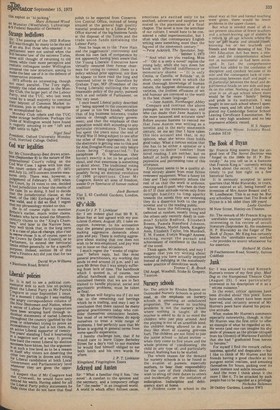Ackroyd and Austen
Sir: "What a familiar ring it has, 'the novel '. A comfort to the spinster and the secretary, and a temporary refuge for " the reader" in an imagined world. A world in which effect follows cause, emotions are excited only to be soothed, adventure and surprise are muted in the pianissimo of a final chapter. The novel is now the armchair of our culture. I would hate to be considered a rabid experimentalist, but I often wish that contemporary English writing were something more than the fag-end of the nineteenth century."
— Peter Ackroyd, The Spectator, September 1, 1973 "'And what are you reading, Miss
'Oh! it is only a novel!' replies the young lady; while she lays down her book with affected indifference or momentary shame. — ' It is only Cecilia, or Camilla, or Belinda' or, in short, only some work in which the most thorough knowledge of human nature, the happiest delineation of its varieties, the liveliest effusions of wit and humour are conveyed to the world in the best chosen language."
—Jane Austen, Northanger Abbey
Compare and contrast the above passages, as the examiners say, and who can doubt that Jane Austen's is the more balanced and accurate view? Before anyone hastens to remind me that Jane Austen was writing as a novelist and in the early nineteenth century, let me say that I have taken this into account and that, in my opinion, what she wrote then holds, good today. What a curious notion that one has to be either a spinster or a secretary to derive ' comfort ' from novel reading. I am neither, but on behalf of both groups I resent the pejorative and patronising tone of this utterance.
Enjoyment seems to be a quality almost entirely absent from most fiction reviewers' equipment. What a funny lot they are! They constantly inform the rest of us that the work is arduous, exacting and ill-paid: why then do they do it? If their attitude varies only from outright hostility to limp apathy towards the novels they are reviewing they do a disservice both to the poor novelist and to the reading public.
What have the following authors (selected at random, mostly living and the others only recently dead) in common? Sybille Bedford, Elizabeth Bowen, Pamela Hansford Johnson, Angus Wilson, Muriel Spark, Kingsley Amis, Elizabeth Taylor, Iris Murdoch, E. M. Forster, Evelyn Waugh? Answer, nothing, except the pursuit and achievement of excellence in the form of the novel.
Think again, Mr Ackroyd, and may I suggest that you try writing about something you have actually enjoyed instead of indulging in the notoriously easier practice of demolition work. Yvonne C. R. Brock Old Angel. Woodhill, Stoke St Gregory, Taunton
































 Previous page
Previous page